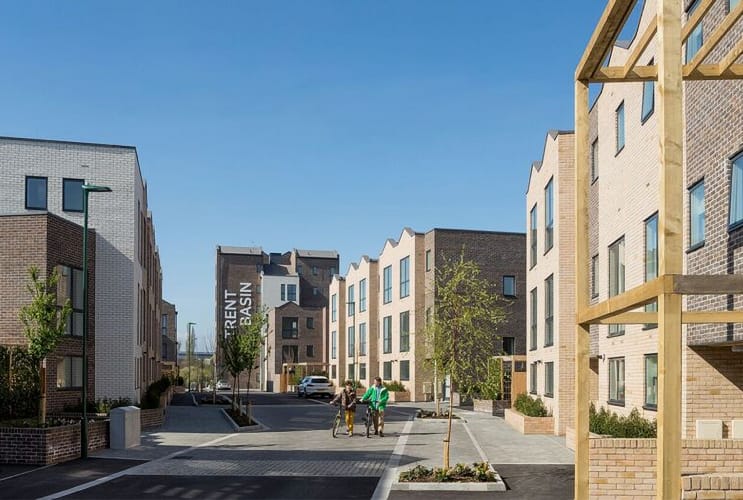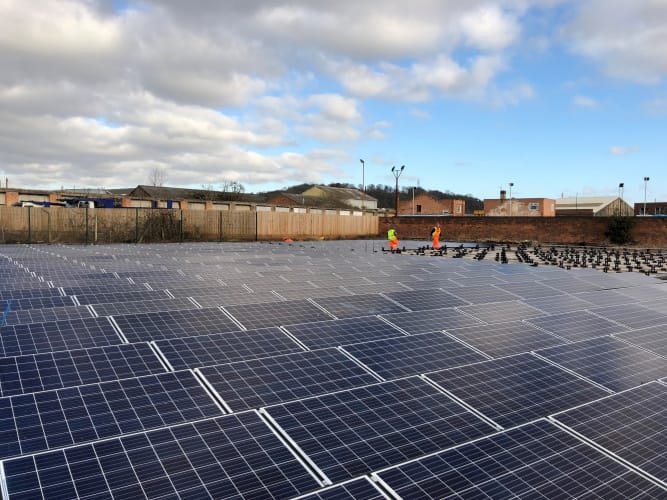
Collaborate to Innovate 2019
Category: Energy and environment
Winner: SCENe (Sustainable Community Energy Networks)
Partners: University of Nottingham with Loughborough University, Igloo Blueprint, Urbed, Siemens, Solar Ready and Confers
Category Sponsor: Goodfellow
Fancy living in a new riverside development close to a city, where residents share a community energy network and you might reduce your energy bills by 25%? Well now you can. Trent Basin, a housing development in Nottingham, is the UK’s first working sustainable community energy networks, and the outcome of some smart sustainable engineering.
Project SCENe is a working partnership between engineers at the University of Nottingham, housing developers, the energy supply chain, a trading platform, industry and Nottingham City council that is transforming local energy infrastructure and is aiming to roll out across the UK.
READ ABOUT THE OTHER C21 2019 WINNERS
The project applies multi-vector energy systems, including solar power and localised energy storage, combined with carbon neutral housing technology, to create what the partners say is the first robust and “smart” business model for sustainable community energy. A team led by Professor Mark Gillott, Chair in Sustainable Building Design at the university and the academic lead for project SCENe, built an early demonstrator living lab at the university campus, using smart technology to monitor and record energy shared usage, which gave commercial partners the reassurance to scale it up.

The model was transferred into Trent Basin where 42 homes are already inhabited and plugged in to the system, another 31 bespoke, sustainable homes are being built and 500 homes are planned. Trent Basin is the first ever new-build residential site to generate, store and use this electrical power for community benefit.
Since May 2018 when the system went online, SCENe has saved 110 tonnes of CO2, generated over 310,000 kW/hours of renewable energy, offset energy costs by 25% and has created a new company and business model that is attracting interest from more housing developers.
House buyers are invited to join the community energy company, with shared profits helping offset energy costs. Data generated by free energy monitoring kits will influence the roll-out of schemes across the UK.
The University of Nottingham has a strong record in this field, as a leading academic institution in energy and sustainability research and currently the only UK university developing new build community energy systems at this scale.
What does the network do?
Firstly SCENe generates its own renewable energy from solar panels fitted on the homes. These feed Europe's largest community battery, supplied by Tesla, that stores power locally and is connected to the national grid.
Then smart monitoring systems capture lots of data using equipment provided by the technologist partners. In-home energy monitoring kits, free to residents, tell residents how much energy they’re using. Interactive apps that show each home’s and the network’s energy usage can be accessed via smart devices. Voice-activated Amazon Echo Spots give more information to residents, on demand, to make better choices about energy consumption. “The system had to be smart, easy and hassle-free for consumers to use, so the benefits are clear to other developers and the system will get more traction,” says Gillott.
The Tesla community battery can store 2.1MWh of energy that delivers 500kW of power, enough to power 167 electric kettles simultaneously for over four hours. It's a key part of the community energy model.
“We make decisions about the energy’s deployment,” says Gillott. “Could we get better value from trading with the grid, at this time? Or could it be best used for vehicle charging, heat generation or local use? It’s about optimising the use of local energy assets while integrating with the national grid to get best value from them.
These decisions are made through a trading platform through an intermediary company called Limejump that trades the energy into the grid.
“In the future we want to do some of this in-house, using machine learning and some of our own bespoke algorithms to allow us to trade energy locally.”
Collaboration exemplified
The consortium of partners delivering the scheme includes developers Igloo Blueprint, AT Kearney, spin-out company Trent Basin ESCO ltd, Smartklub, Siemens, URBED, Slam Jam, Sticky World, Solar Ready, plus Loughborough University and with support from Nottingham City Council.
“For me the key to its success is the industry collaboration,” says Prof. Gillott. “Its vitally important that we decarbonise the built environment. We need partnerships between industry and academia to deliver this is in the real world, to exploit our research and scale this up. The key thing for entering this award is that it could not have been realised without collaborations between the housing and energy industries, developers, technology suppliers, linked with ourselves to deliver this platform.”
Trent Basin is also a unique business model, Gillott says. Here the energy system is developed with the developer but they are not taking the risk. From the early work on campus, SCENe has created an energy services entity, a special purpose vehicle called Trent Basin ESCO ltd, to trial and test the business model using the assets that are connected. “SmartKlub (ESCO partner) takes the risk and manages the project, derisking it for developers,” says Mark.
SmartKlub is a business model innovator focusing on making community energy initiatives easy and viable in order to achieve carbon reduction,” says its CEO Charles Bradshaw-Smith. “For SCENe we focused on developing and approach for developers to make renewables "hassle free" for them and their homebuyers. We contributed to the energy system design, regulatory barriers and solutions, as well as the engagement and service of the residents.
“One unexpected value-add was becoming "community builders" due to our engagement and shaping of the residents offer. We have been pleased with progress but the work is not yet done. SmartKlub has a 5-year R&D agreement with The University of Nottingham to achieve further innovations around heat and energy arbitrage in order to achieve full value and CO2 savings. We aim to deliver similar projects other developers and communities.
Funding and future
Seed funding came from the Energy Research Accelerator and Innovate UK, where SCENe was a case study in a July 2018 UK government consultation on the future of small-scale low-carbon generation. A second government report also highlighted how projects like SCENe foster a sense of community ownership of energy systems. A lot of infrastructure money has come from industry. Trent Basin is a £100 million housing scheme, funded by private industry.
Trent Basin is now attracting national and international interest in the concept of Local Community Energy, and Nottingham is showing its results to global businesses. One outcome to promote is that 83% of the Trent Basin residents would recommend the installation of energy storage equipment in their homes to other members of their community.
“We have already been approached by other developers wanting to collaborate on new projects,” Mark says. “We first want to take this out across the Nottingham area. Some aspects wont work for everyone, but it proves how to operate a smart local energy system with a business model that is viable and hassle-free for consumers to use.”
The Energy and Environment category sponsor is Goodfellow
The headline sponsor for C2I 2019 is Frazer-Nash Consultancy











McMurtry Spéirling defies gravity using fan downforce
Ground effect fans were banned from competitive motorsport from the end of the 1978 season following the introduction of Gordon Murray's Brabham...